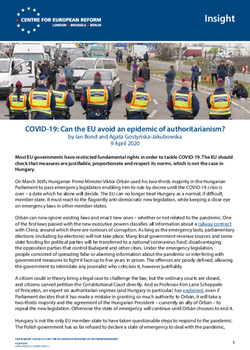
COVID-19: Can the EU avoid an epidemic of authoritarianism?
Most EU governments have restricted fundamental rights in order to tackle COVID-19. The EU should check that measures are justifiable, proportionate and respect its norms, which is not the case in Hungary.
On March 30th, Hungarian Prime Minister Viktor Orbán used his two-thirds majority in the Hungarian Parliament to pass emergency legislation enabling him to rule by decree until the COVID-19 crisis is over – a date which he alone will decide. The EU can no longer treat Hungary as a normal, if difficult, member-state. It must react to the flagrantly anti-democratic new legislation, while keeping a close eye on emergency laws in other member-states.
The EU can no longer treat Hungary as a normal, if difficult, member-state. It must react to the flagrantly anti-democratic new legislation, while keeping a close eye on emergency laws in other member-states.
Orbán can now ignore existing laws and enact new ones – whether or not related to the pandemic. One of the first laws passed with the new executive powers classifies all information about a railway contract with China, around which there are rumours of corruption. As long as the emergency lasts, parliamentary elections (including by-elections) will not take place. Many local government revenue sources and some state funding for political parties will be transferred to a national ‘coronavirus fund’, disadvantaging the opposition parties that control Budapest and other cities. Under the emergency legislation, people convicted of spreading false or alarming information about the pandemic or interfering with government measures to fight it face up to five years in prison. The offences are poorly defined, allowing the government to intimidate any journalist who criticises it, however justifiably.
A citizen could in theory bring a legal case to challenge the law, but the ordinary courts are closed, and citizens cannot petition the Constitutional Court directly. And as Professor Kim Lane Scheppele of Princeton, an expert on authoritarian regimes (and Hungary in particular) has explained, even if Parliament decides that it has made a mistake in granting so much authority to Orbán, it will take a two-thirds majority and the agreement of the Hungarian President – currently an ally of Orbán – to repeal the new legislation. Otherwise the state of emergency will continue until Orbán chooses to end it.
Hungary is not the only EU member-state to have taken questionable steps to respond to the pandemic. The Polish government has so far refused to declare a state of emergency to deal with the pandemic, despite having the power to do so under the Polish constitution and a 2002 law. Instead, it has revised a 2008 act on preventing and combating infectious diseases, to allow the central government rather than the Polish regions to declare an epidemic, and to permit compulsory quarantine or hospitalisation. The measures to fight the pandemic can remain in force for up to a year, though some are intended to be more short-term.
The government has done this because the existing rules governing states of emergency would have forced it to delay the scheduled presidential election from May until 90 days after the state of emergency ended. The government believed that a long delay would disadvantage the incumbent, Andrzej Duda, backed by the governing Law and Justice Party (PiS), who is the favourite to win.
The Polish government is simultaneously in the process of amending the electoral law to allow the presidential election to proceed through a postal ballot. The Polish ombudsman and other constitutional lawyers argue that both the procedure for introducing restrictions on civil liberties and the fact of amending the electoral law so close to the election are unconstitutional. But since the government has stacked the Constitutional Tribunal in its own favour since it came to power in 2015, a successful challenge is highly unlikely.
The Polish case suggests that the Hungarian Ministry of Justice was not entirely wrong to argue that in the face of the pandemic “ordinary solutions and traditional approaches” had proved inadequate, and that other EU member-states had also introduced exceptional measures. The question is whether Orbán’s new powers go beyond ‘exceptional’ to ‘unacceptable’.
Many countries, including Germany, Italy and Spain, are restricting constitutionally guaranteed rights such as freedom of assembly. Data from Oxford University’s Blavatnik School of Government suggests that among EU member-states, Hungary’s restrictive measures are similar to those of Italy and Spain, and slightly less stringent than the toughest regimes, those of Austria and Croatia; Poland’s measures are less tough than Hungary’s, and on a par with those in Denmark, Greece and Ireland. It is worth noting, however, that Austria, Denmark and the Czech Republic have announced plans to ease restrictive measures in the coming days. International human rights norms allow governments to restrict some fundamental rights to deal with emergency situations, including threats to public health. But the restrictions need to have a legal and scientific basis; they have to be necessary to deal with the threat, proportionate to it and time-limited; and they need to be subject to review. The legal and practical steps taken in most EU member-states comply with these principles (even in Poland, to a limited extent); Hungary’s emergency legislation does not.
Parliaments in France, Germany, Italy, Poland and Spain remain in session (though often with a reduced number of meetings and with fewer MPs than usual present, because of the risk of infection spreading), and can still to some extent hold governments to account for the operation of emergency measures.
In France, the government has to publish the scientific advice behind a declaration of a health emergency. If it wants to extend the state of emergency, parliament must pass a law, backed by further scientific advice. And any restrictive measures lapse when the health emergency ends.
In Germany, the Bundestag has transferred some powers for fighting the pandemic from the Länder to the federal government through amendments to the ‘Infection Protection Law’. But these amendments expire after a year, and the Bundestag can repeal anti-pandemic measures introduced by the government when it decides that they are no longer necessary.
In Italy, Prime Minister Giuseppe Conte’s initial decree-law required retrospective parliamentary ratification within 60 days, and the implementing decrees issued subsequently by the prime minister are time-limited (though they can be extended).
In Spain, the government was able to declare a ‘state of alarm’. That enabled it to take over some regional government responsibilities, such as healthcare and to take control of regional police forces and civil services. It also allowed the government to limit travel, requisition property and issue instructions to private hospitals. But a state of alarm only lasts 15 days, after which parliament must renew it every 15 days, and can vary its scope.
Many of the laws passed or the measures taken by governments to combat the pandemic are also open to challenge in the courts, either on constitutional grounds or because of their impact on individuals or specific groups. In practice, however, the courts themselves may be unable to function because of restrictive measures affecting court staff.
Despite the evidence of the last ten years that Orbán has removed constitutional checks and balances, the EU’s response to breaches of fundamental rights in Hungary has been weak and divided. Commission President Ursula von der Leyen said in a statement on March 31st that it was “of the utmost importance that emergency measures are not at the expense of our fundamental principles and values as set out in the treaties”, and promised that the Commission would monitor the application of such measures in all member-states. She only referred to Hungary by name two days later, in response to a direct question.
Sixteen EU member-states signed up to a statement expressing their deep concern “about the risk of violations of the principles of rule of law, democracy and fundamental rights arising from the adoption of certain emergency measures” – but also without naming Hungary (thus in an ironic twist enabling the Hungarian justice ministry to say that it too aligned itself with the statement). Ministers of Justice agreed in a video conference on April 6th with the Commissioner for Justice, Didier Reynders, that any measures adopted by member-states to deal with the pandemic should respect the rule of law and EU values – glossing over the fact that Hungary’s measures already violate this standard.
Von der Leyen and Reynders are right to want to look at what all member-states are doing, not just Hungary: there is a risk that other governments will try to keep some of the powers they have acquired to control the behaviour of their citizens, even after the justification for them has gone. But after ten years of Orbán eroding the rule of law in Hungary, there is no reason for the Commission to give him the benefit of the doubt.
The EU’s formal procedures for dealing with violations of EU values have shown themselves to be ineffective so far. Under Article 7 of the Treaty on European Union, a member-state’s voting rights can be suspended in response to a “serious and persistent breach of EU values”, but the decision that a breach exists in one member-state requires the unanimous agreement of the others, which is in practice impossible to achieve. Putting effective pressure on Hungary will require a mixture of short- and long-term steps, both formal and informal.
Putting effective pressure on Hungary will require a mixture of formal & informal steps. @EPP should stop shielding Orban from EU pressure. @EU_Commission should urgently ask the ECJ if Hungary’s emergency legislation breaks EU law.
Orbán’s European political family, the European People’s Party (EPP), should stop shielding him from EU pressure. Fourteen EPP party leaders from ten EU member-states, plus Norway, have written to EPP president Donald Tusk calling for the expulsion of Orbán’s Fidesz party from the group. But Germany’s CDU and CSU are not among them. It is time for Angela Merkel to put pressure on her party colleagues to do the right thing without further delay.
The Commission should urgently ask the Court of Justice whether the emergency legislation in Hungary and the decrees adopted under it violate EU law. The classification of information about the Budapest to Belgrade railway contract may well violate the procurement directive covering transport contracts, for example.
In the medium term, Reynders should examine the rule of law situation in all member-states thoroughly and draft an annual report, as he promised when appointed. Even before the outbreak, the rule of law was under threat in several member-states, not just Hungary. Reynders must now check that emergency legislation related to COVID-19 complies with the rule of law. And the German presidency in the second half of 2020 should ensure that the Commission’s report forms the basis for the Council’s annual discussion of the rule of law in the EU, with follow-up action as necessary.
The Commission is due to update its proposal for the EU’s 2021-2027 Multiannual Financial Framework (MFF), among other things to include a ‘Marshall Plan’ to deal with the consequences of the COVID-19 crisis. It should continue to insist on linking disbursement of EU funds to the state of the rule of law in recipient countries. If it is acceptable to block payments to member-states for not complying with EU budgetary discipline, it should also be possible to withhold EU taxpayers’ money from countries violating basic EU principles. The MFF should also include direct funding (not via the governments of member-states) for independent media and civil society organisations fighting for the rule of law, which are otherwise likely to become victims of the economic fallout from the crisis.
If it is acceptable to block payments to member-states for not complying with EU budgetary discipline, it should also be possible to withhold EU taxpayers’ money from countries violating basic EU principles.
In the long term, member-states and EU institutions should consider how to change the incentives that have encouraged the EPP to protect Fidesz. Currently, some EPP constituent parties probably think they stand to lose more by expelling the Hungarian party (and presumably seeing its votes go to another group in the European Parliament) than by tolerating its behaviour. Ideally, the EU institutions should revise the regulation on the statute and funding on European political parties and foundations to make it easier to de-register the whole political family (thereby among other things depriving it of the right to apply for a share of the €50 million EU funding available for European political parties) if it refuses to take action against a member party that has persistently violated European values.
The mantra of the WHO for dealing with COVID-19 is ‘test, test, test’ – and then isolate those who have the infection. The EU, too, should test: whether laws adopted by member-states to tackle the pandemic are compatible with EU values and democratic standards. It is already clear, however, that Hungary’s new law violates international human rights norms. EU leaders, and especially Orbán’s EPP colleagues, must now put him in political isolation until they can find a cure for Hungary’s slide into autocracy. If they carry on with business as usual, the virus of authoritarianism may spread faster to other member-states.
Ian Bond is director of foreign policy and Agata Gostyńska-Jakubowska is a senior research fellow at the Centre for European Reform.




Add new comment